696
About moonshining
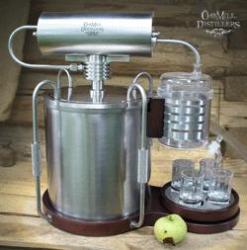
The history of the device is lost in the darkness of the times. A start in the days when we have learned to separate the liquid substance from each other by means of evaporation and then condensation. Thus, by separating the more volatile heavy. It was a trivial procedure in practice alchemists. Do you remember the glass bulb with bubbling liquid and leaving them on the coils.
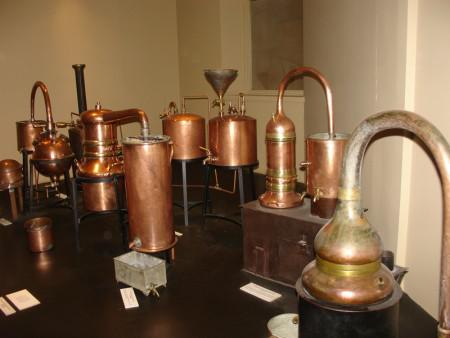
Throughout its history brew prepared in various ways with an incredible number of devices, ranging from huge, almost industrial dimensions, finishing compact miniaturized devices. Depending on the size and scope of the manufactured product are divided into "public" and personal. If the unit was large and had been able to produce moonshine in large quantities in a short period of time, most of them used by all residents of the small settlement where it was located, one by one.
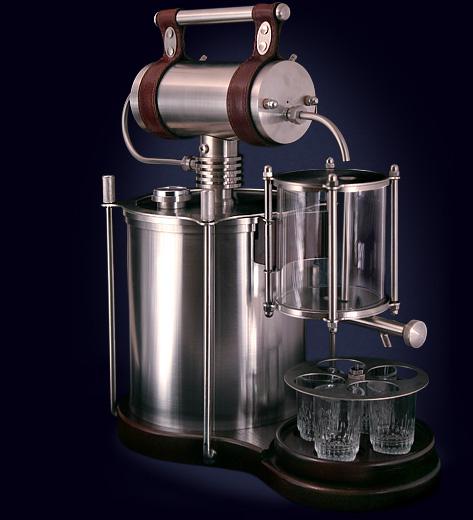
Getting brew based on evaporation and condensation and then displayed in a separate bowl of the light fraction in fermented Braga - alcohol.
And the design for the most part as follows:
vessel with Braga;
coil;
a device for cooling the coil.
Of the old "recipes": "From 1 1/2 pounds of flour and yeast (you can take and hops) turns around 1st bucket moonshine booze fortress around 25 degrees.
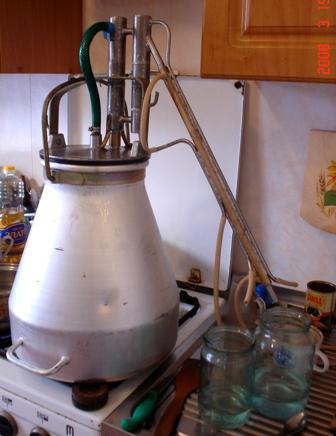
The first batch is distilled from fermented grain mash alcoholic liquid gives the strongest alcohol - "Pervatsch" or "goryuchku" (off), the second portion - "vtoryak" - weaker and the third - "Tretiak" - even weaker, so that the total mixture of an alcoholic beverage strength of 25 degrees.
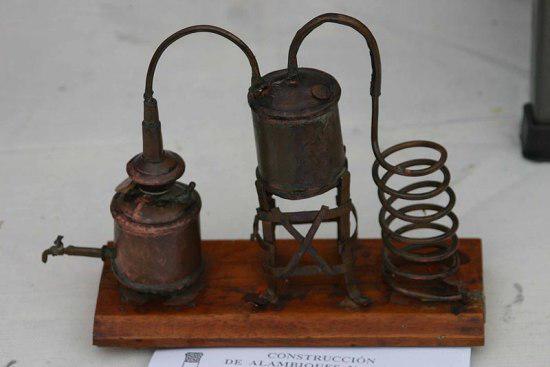
The city is simply unthinkable was the use of aggregates in the overall housing conditions, which led to the upgrading of the device and reduce its size. Immediately they got separation by the method of heating, the electrical and open flame.
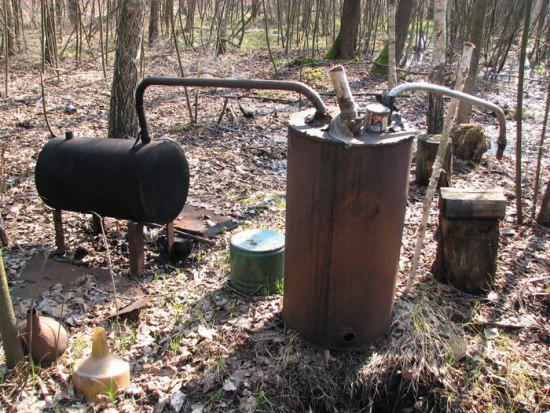
But it is also possible to exclude the coil, which simplifies the design of moonshine in the extreme, but the manufacturing technology is slightly more complicated, requiring your process a little more attention.
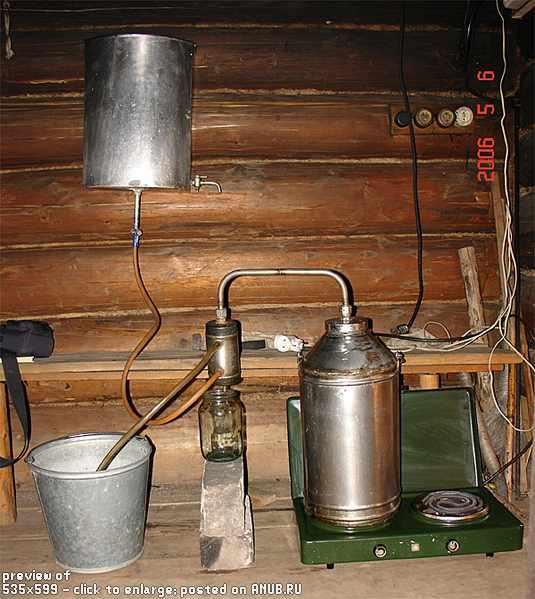
Despite the huge number of varieties of moonshine most widely used machines that are based on a simple milk cans. This was due to the fact that the vessel is already equipped with all the necessary hermetic properties.
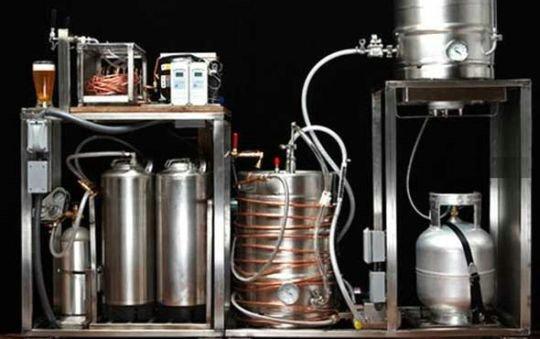
HISTORY:
In Russia, the broad masses of the people until the 16th century were still slightly affected by alcohol; people were sober, and he was allowed only on major holidays cooking intoxicating drink - home-made beer, honey. Imported grape wine, which they drank the princes, nobles and merchants, the people were completely unavailable, as it is very cost dorogo.No from the 16th century, it began to spread among the people penetrated into Russia from abroad cheaper grain vodka; at this time it was built by Tsar Boris Godunov treasury tsar's tavern.
Russia has also learned how to prepare pure alcohol and vodka. Since then, Russian government planted drunkenness in order to obtain profits. Liquor made large section of public revenues, as people on a large scale and has become rampant consume vodka.
In the 16th and 17th centuries the government had its taverns. Set by the government pledged to bail out the sellers from the sale of certain of vodka, the amount assigned to them. In support of the obligations they brought oath kiss religious objects - the cross and the Gospel, and why they are called "barmen" (the name of landlords to hold on to pubs and until very recently). If they are not rescued the desired amount, then they put them on the "pravezh", that is, beat them on the square Batog the legs.
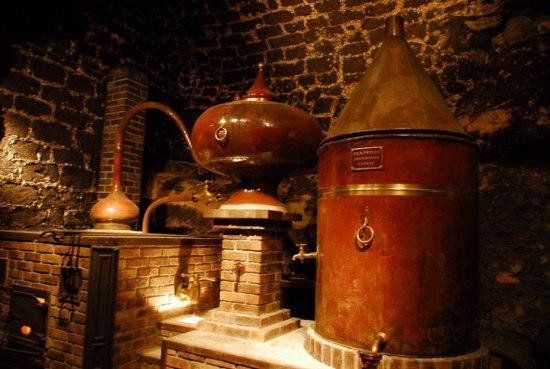
* First tavern was opened in Moscow in the area on the Baltschug, Tsar Ivan IV the Terrible for his guardsmen.
* Most saw Moscow and Moscow Province.
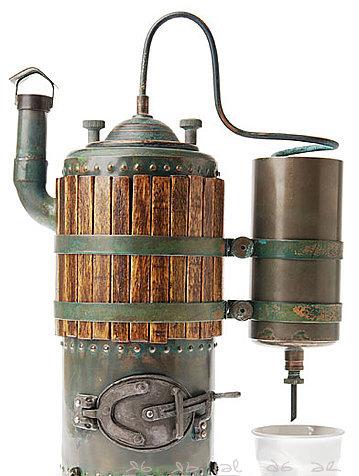
Revenue from the sale of alcoholic beverages was then about 1/3 of all government revenues. In the last years before the First World War, the peoples of Russia spent on alcoholic beverages of more than one billion rubles, than about 900 million rubles of which was spent only for vodka. These 900 million rubles, which receives the breech wine monopoly, and that is almost 4 times more modern single agricultural tax, as it were in the form of additional tax have made almost exclusively workers and peasants, as they were then the main consumers of cheap vodka.
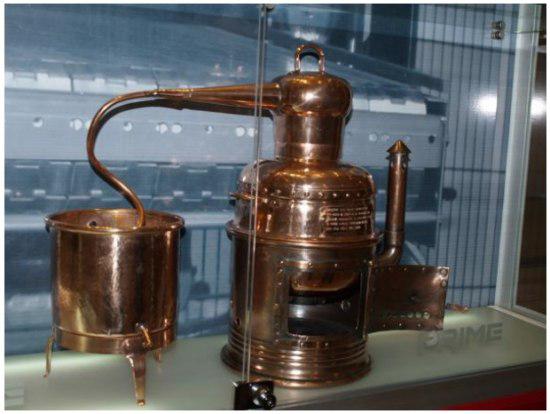
And finally: drink wisely!






















